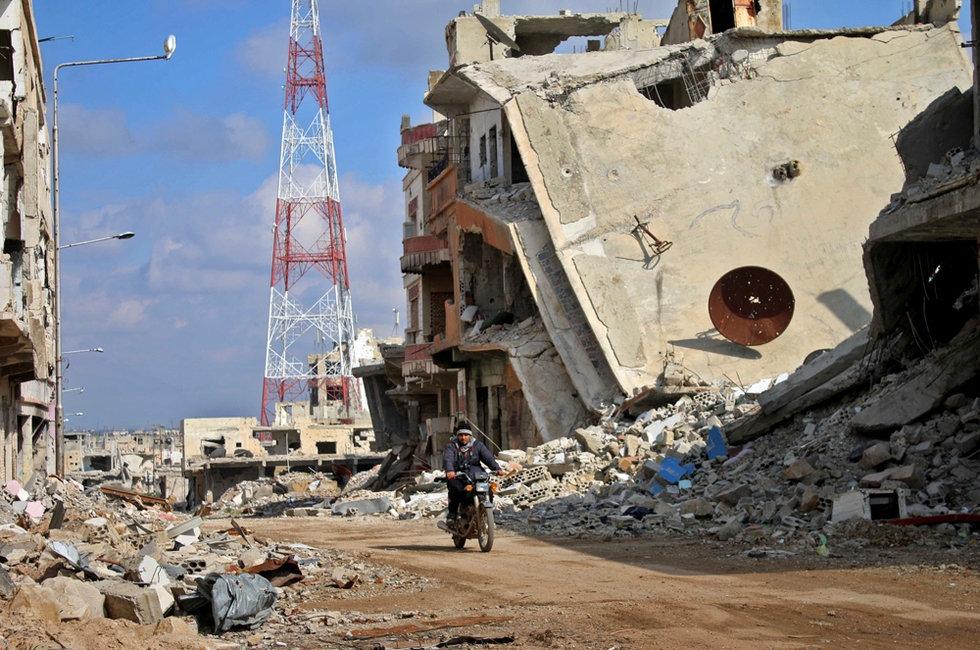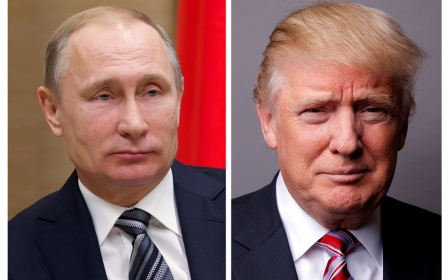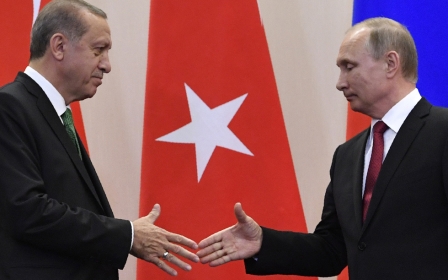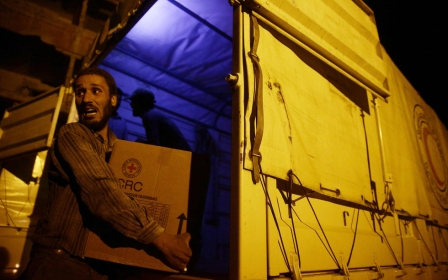Iran, Russia and Turkey sign pact on 'safe zones' in Syria

Russian, Iran and Turkey have signed a memorandum supporting the creation of Moscow-backed safe zones in Syria.
An AFP reporter at peace talks in the Kazakh capital Astana saw the heads of the delegations - who represent the three countries sponsoring the negotiations - sign the document.
The Syrian armed opposition on Wednesday had suspended its participation in the talks held in Kazakhstan after continued bombing of areas under its control by Syrian government forces, but announced their return later that day. Following the agreement of the deal, however, they stormed out again, angry at having Iran as a military guarantor.
The Russian proposal is to create four de-escalation zones intended to quell fighting in the country's six-year-old civil war, Syrian state media reported the foreign ministry as having said on Wednesday.
"The Syrian Arab Republic supports the Russian initiative on de-escalation zones and confirms its commitment to the cessation of hostilities regime signed 30 December, 2016, which includes not bombing these regions," said state news agency SANA, reporting a foreign ministry statement.
The report also said the Syrian army would continue to fight against what it termed terrorist groups across Syria.
Russia had said it hoped to negotiate on Thursday the creation of four de-escalation zones in Syria after reaching an agreement with Turkey - which is backing some rebel groups - on Wednesday.
"We both proceed on the basis that - and this is our common position - the creation of safe zones should lead to further pacification and cessation of hostilities," Putin told a news conference alongside Turkish counterpart Recep Tayyip Erdogan at the Black Sea resort of Sochi.
The Syrian Arab Republic supports the Russian initiative on de-escalation zones and confirms its commitment to the cessation of hostilities
Statement by Syrian foreign ministry
Putin said the proposed safe zones in Syria should become no-fly areas if fighting on the ground stops entirely and that they "should lead to the complete restoration of the country's territorial integrity".
Erdogan said that the plan to create such a zone in Syria's Idlib province had been raised during talks with Putin.
"I hope that the de-escalation (there) will continue to be maintained," Erdogan said.
Turkey's foreign ministry said on Thursday that the safe zone would cover all of Idlib province, as well as parts of Aleppo, Latakia and Homs. It said the deal would ban all use of weapons in those areas, and allow humanitarian aid to be brought in.
Putin did not elaborate on how the safe zones would be controlled, saying this was "an issue for separate talks".
UN Special Envoy for Syria Staffan de Mistura hailed the plan as a step in the right direction towards a real cessation of hostilities.
"Today in Astana I think we have been able to witness an important promising positive step in the right direction in the process of de-escalation of the conflict," de Mistura told reporters.
Russia's lead negotiator on Syria Alexander Lavrentyev said that Moscow was ready to work more closely with the United States and Saudi Arabia on Syria.
"Unfortunately, the Americans are still ignoring our attempts to establish closer military cooperation but we will keep trying," he said. He also said that Moscow was ready to send its observers to Syria's free zones.
The United States gave an extremely cautious welcome to the plan on Thursday.
The State Department said Washington hopes the agreement will help stem the violence but expressed concern at Iran's involvement in negotiating the deal.
An Arabic-language version of the proposal drafted by Russia and obtained by AFP calls for the creation of such zones in rebel-held territory in the northwestern province of Idlib, in parts of Homs province, in the south, and in the opposition enclave of Eastern Ghouta near Damascus.
The aim is to "put an immediate end to the violence" and "provide the conditions for the safe, voluntary return of refugees" as well as the immediate delivery of relief supplies and medical aid, the document said.
Read more: Trump and Putin discuss Syria in call
Putin also said he had discussed the plan and other ways to boost the ceasefire in Syria with US President Donald Trump in a phone call on Tuesday.
"As far as I can tell, the American administration supports these ideas," Putin said.
The Astana talks are portrayed as a complement to broader UN-backed peace efforts in Switzerland that have so far failed to bridge major rifts between the warring sides.
Before they began, the rebel side laid out a list of demands including a regime withdrawal from areas taken after the start of a tattered ceasefire at the end of last year that the opposition accuses Damascus of frequently violating.
The Syrian Observatory for Human Rights monitor meanwhile said a car bomb on Wednesday killed at least five people in the rebel-held town of Azaz near the Turkish border.
The blast followed a bloody militant assault on Tuesday by the Islamic State group against a camp for displaced people on the border with Iraq that left at least 46 people dead.
New MEE newsletter: Jerusalem Dispatch
Sign up to get the latest insights and analysis on Israel-Palestine, alongside Turkey Unpacked and other MEE newsletters
Middle East Eye delivers independent and unrivalled coverage and analysis of the Middle East, North Africa and beyond. To learn more about republishing this content and the associated fees, please fill out this form. More about MEE can be found here.




